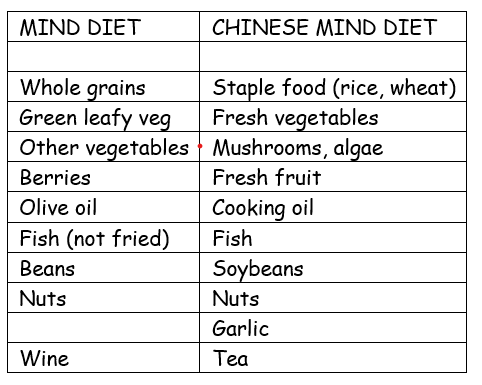I’m giving this lecture at UCSC, Sponsored by the Humanities Institute. Title: “Food Politics 2026: Sustainable Food in the Trump Era.” 6:00 p.m. Cowell Ranch Hay Barn, Ranch View Rd. Register here.
The ultimate fusion diet: Chinese-Mediterranean?
I learned about this from reading a headline in FoodNavigator-Asia: Mediterranean diet linked to reduced neurodegeneration in elderly Chinese.
This got my attention: Why would anyone be studying the Mediterranean diet in Chinese people. The traditional Chinese diet, like that of the Mediterranean diet, is largely plant-based and strongly associated with health and longevity.
But here we have it. Basically, they want to know if this diet works in Chinese as well as North American and Oceanic populations. As so it does.
The study: Association of adherence to the Chinese version of the MIND diet with reduced cognitive decline in older Chinese individuals: Analysis of the Chinese Longitudinal Healthy Longevity Survey. The Journal of nutrition, health and aging. Available online 1 January 2024, 100024
- Purpose: This study aimed to assess the correlation between the Chinese version of the MIND (cMIND) diet and cognitive impairment in older Chinese individuals. [MIND = Mediterranean-Dietary Approaches to Stop Hypertension (DASH) diet intervention for Neurodegenerative Delay].
- Method: The cMIND diet score (cMINDDS) was calculated by assessing dietary patterns based on survey responses.
- Results: The increased cMINDDS was associated with a reduced risk of cognitive impairment. Higher consumption of fresh fruits and nuts was associated with a decreased risk of cognitive impairment (OR = 0.77, 95% CI: [0.66, 0.89] and OR = 0.70, 95% CI [0.58, 0.86], respectively).
- Conclusion: Adherence to the cMIND diet was associated with lower risks of cognitive impairment in older Chinese individuals.
About the diets
The MIND diet recommended 10 brain-healthy food groups (green leafy vegetables, other vegetables, nuts, berries, soybeans, whole grains, not fried fish, not fried poultry, olive oil, and wine) while avoiding five unhealthy groups (red meat and products, butter/margarine, cheese, pastries and sweets, and fast fried foods).
The cMIND diet comprises 12 components: staple food composition, quantity, fresh vegetables, mushrooms or algae, fresh fruits, fish, cooking oil, soybeans, nuts, garlic, tea, and sugar.
Here’s a quick comparison:

Comment: Both diets are healthy.
Bottom line (can’t be emphasized enough, apparently): Eating a healthy diet is good for health.

